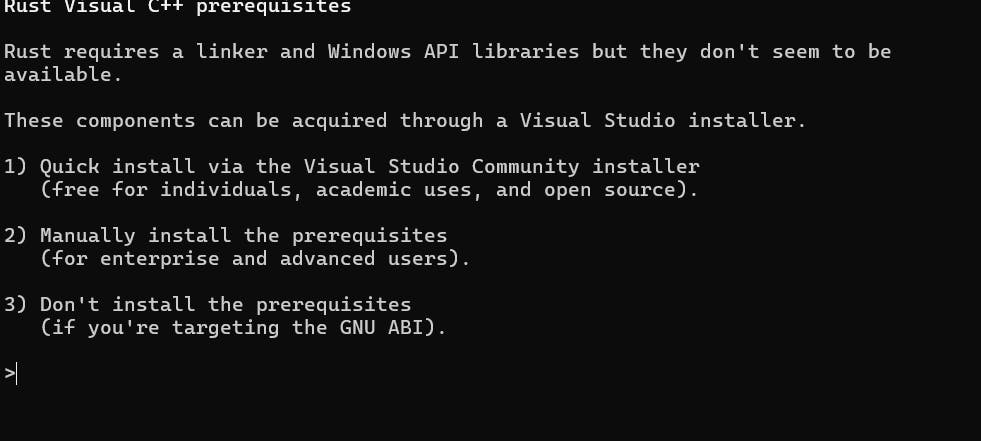Why Learn Rust?
Memory Safety: Rust ensures memory safety without a garbage collector.
Concurrency: Rust enables safe and efficient concurrent programming.
Performance: Rust offers performance comparable to C and C++.
Community: Rust has a vibrant community and ecosystem supported by Cargo.
Versatility: Rust is versatile and supports cross-platform development.
Installing Rust on Windows


Step 1: Quick Install
Step 2: let's Get Rusty
If you get some error rustup and cargo not found make sure to install the respective packages according to your operating systems
Hello World In Rust 🦀
fn main(){
println!("Hello World");
}
Data Types In Rust 🦀
Primitive Data Types:
Integer Types: Represent whole numbers. Examples include
i32,u64,i8, etc.Floating-Point Types: Represent numbers with fractional parts. Examples include
f64andf32.Boolean Type: Represents true or false values. Denoted by
bool.Character Type: Represents a single Unicode character. Denoted by
char.
Compound Data Types:
Arrays: Fixed-size collections of elements of the same type. Denoted by
[T; N], whereTis the type of elements andNis the number of elements.Tuples: Fixed-size collections of elements of possibly different types. Denoted by
(T1, T2, ...).
fn main() {
// Primitive data types
let integer: i32 = 42;
let floating_point: f64 = 3.14;
let boolean: bool = true;
let character: char = 'A';
println!("Integer: {}", integer);
println!("Floating point: {}", floating_point);
println!("Boolean: {}", boolean);
println!("Character: {}", character);
// Compound data types
let array: [i32; 3] = [1, 2, 3];
let tuple: (i32, f64, bool) = (10, 3.14, false);
println!("Array: {:?}", array);
println!("Tuple: {:?}", tuple);
// Accessing elements in array and tuple
println!("First element of array: {}", array[0]);
println!("Second element of tuple: {}", tuple.1);
}
Conditional Statements In Rust 🦀
fn main() {
let number = 10;
// Simple if-else statement
if number > 0 {
println!("Number is positive");
} else {
println!("Number is non-positive");
}
// if-else if-else statement
if number > 0 {
println!("Number is positive");
} else if number < 0 {
println!("Number is negative");
} else {
println!("Number is zero");
}
// Using if in let statement (if as an expression)
let is_positive = if number > 0 {
true
} else {
false
};
println!("Is number positive? {}", is_positive);
}
Operators in Rust 🦀
fn main() {
// Arithmetic operators
let a = 10;
let b = 5;
println!("Addition: {}", a + b);
println!("Subtraction: {}", a - b);
println!("Multiplication: {}", a * b);
println!("Division: {}", a / b);
println!("Remainder: {}", a % b);
// Comparison operators
let x = 10;
let y = 20;
println!("Equal to: {}", x == y);
println!("Not equal to: {}", x != y);
println!("Greater than: {}", x > y);
println!("Less than: {}", x < y);
println!("Greater than or equal to: {}", x >= y);
println!("Less than or equal to: {}", x <= y);
// Logical operators
let p = true;
let q = false;
println!("Logical AND: {}", p && q);
println!("Logical OR: {}", p || q);
println!("Logical NOT: {}", !p);
// Bitwise operators
let m = 0b1010; // Binary representation of 10
let n = 0b1100; // Binary representation of 12
println!("Bitwise AND: {:b}", m & n);
println!("Bitwise OR: {:b}", m | n);
println!("Bitwise XOR: {:b}", m ^ n);
println!("Bitwise NOT: {:b}", !m);
// Assignment operators
let mut c = 5;
c += 3; // Equivalent to c = c + 3
println!("Compound Assignment: {}", c);
// Increment and decrement operators
let mut d = 10;
d += 1; // Increment
println!("Increment: {}", d);
d -= 1; // Decrement
println!("Decrement: {}", d);
// Range operator
for i in 1..=5 {
println!("Inclusive Range: {}", i);
}
}
Pointers in Rust 🦀
fn main() {
let x = 42;
// Reference: Immutable reference to x
let reference_to_x = &x;
println!("Value of x via reference: {}", *reference_to_x);
// Mutable reference: Mutable reference to x
let mut y = 10;
let mutable_reference_to_y = &mut y;
*mutable_reference_to_y += 5;
println!("Value of y via mutable reference: {}", *mutable_reference_to_y);
// Raw pointer: Immutable raw pointer to x
let raw_pointer_to_x: *const i32 = &x;
unsafe {
println!("Value of x via raw pointer: {}", *raw_pointer_to_x);
}
// Raw pointer: Mutable raw pointer to y
let mut z = 20;
let raw_pointer_to_mut_z: *mut i32 = &mut z;
unsafe {
*raw_pointer_to_mut_z += 10;
println!("Value of z via mutable raw pointer: {}", *raw_pointer_to_mut_z);
}
}
Control Flow 🦀
// Match Expressions
let number = 5;
match number {
1 => println!("One"),
2 => println!("Two"),
3..=5 => println!("Three to Five"),
_ => println!("Other"),
}
// Loop Statements
let mut count = 0;
loop {
println!("Count: {}", count);
count += 1;
if count >= 5 {
break;
}
}
// For loop
for number in 1..=5 {
println!("Number: {}", number);
}
// Enhanced For Loop
